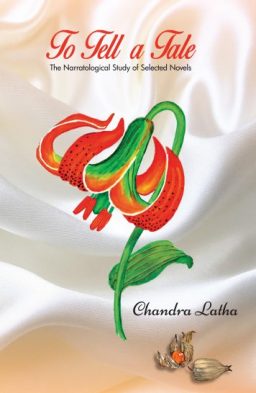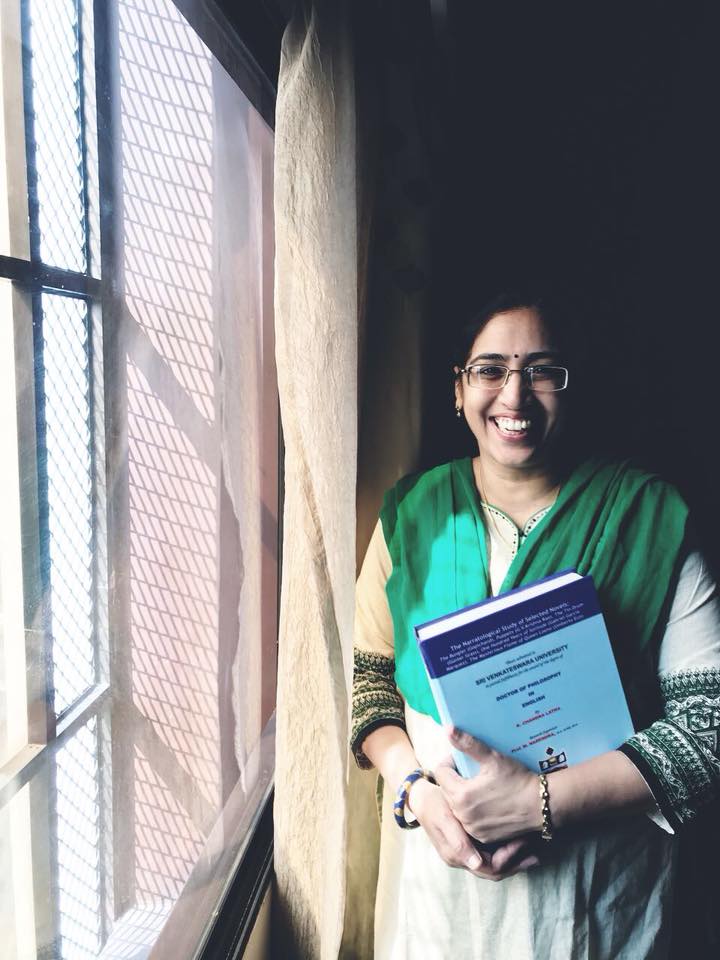
To tell a tale-19
(Chapter-3 Part-5)
-Chandra Latha
Among the other characters, Lakshamamma, Lalitha, Padma and Ammayamma need special mention. Minor characters like Sita, Jaggaa Rao’s mother and have their own crucial roles to play. Describing the nature of Laxmamma the writer relates, “Human nature is very strange. An atom can be split, the moon visited and the conditions there ascertained, the human body cut into pieces and stitch together to restore life. But, the mind that achieves all these things cannot be fathomed, nor it’s capacity imagined. We cannot draw boundaries to define its limits.
Consider the case of the doctor. He had heard what Lakshmamma muttered in her delirium. He was not altogether unfamiliar with human psychology. Of course he no propensity to treachery.’’(Puppets, Pg. 133)
At another occasion, as quoted by Nidadavolu Malathi, http://thulika.net/? p=906 http://thulika.net/?p=906
G.V.Krishna Rao argues “We have acquired modern, scientific and technical knowledge. Rationalism has taken place in our lives. Industries have been set up and wealth has prospered. The appetite to go for it [wealth] one way or another also has increased. We’ve gotten used to materialistic culture and started pursuing physical pleasures. In the process, we are becoming increasingly slaves of material possessions and thought. Ethical values are waning; generosity and appreciation of fine arts are disappearing. We must not ignore economic values, which we have learned from western civilization. But are the economic values the same as all values? Unfortunately, we see them only racing our lives today. What is happening to this society? Are we forgetting gradually the culture that has put dharma on high pedestal writers, being unable to see the world perceptible by the five senses, are commemorating the world of the past. Even those who could see the modern world are unable to comprehend it. Even if comprehended it, they are only playing a game like ring-around circus but unable to resonate with it. A writer may become a poet only when he watches the present day world, comprehend it, ache for it and then proffer his views to the world. If he fails to do so, he becomes simply a seeker of renown.” and made us visualize Truth, Beatitude and beauty; are we forgetting ourselves? (Russia lo raithu, Page No.165, navathoranam, itara sahihtya vyaasaalu, Prbhasa Publications, 1999)
Puppets can be described as a mock epic novel. It perfectly suits Henry Fielding’s definition of a novel, “a comic epic in prose”. The narrative style employed is lofty with the usage of both classical and colloquial language. Imagery is also a combination of classical rhetoric and the simple realist prose. The lofty narrative style and the conventions are employed to describe the trivial things. A simple lie, which was a misunderstanding of a daughter with her drowsy drooping father, stirred each and every soul in the village, reached up to the minister of the state, police action, court, arson, violence, killings, jail and bail, dharma and adhrama any many folds of philosophical debates. The mockery is the sincere tone in establishing the lie as a truth is contributed by every fold of life. Pullayya, major character of the novel is introduced as a tiger with two hands long tail and quickly added with a sentence, perhaps may be short by a finger length. Just before this hyperbole introduction, reader is aware of the fear that is haunting him, fear of his wife.
Describing the country he realties, “Bharath is a great country and it is our villagers who are responsible for that greatness. This culture is a mystery to city-bred, college-educated youngsters. What does the young crow know about the blow from a catapult? The villagers preserve our ancient traditions and practices.” (Puppets, Pg.24) Detailed information that follows gives a truthful tone and establishes the fact. Mock epics incidentally make fun of the elaborate conventions of epic poetry, including invocations, battles, supernatural machinery and epic similes.
This novel records one of the most heinous acts of the government of the newly formed independent India. The ruling party raided the communists of coastal Andhra. Malabar Police Battalions’ were launched to search and arrest communists in the state. It was described as “cleansing” of the state.
Sahavasi writes, “Katuru, Ellamarru are two prominent villages in Krishna district and politically inclined to communism. Villagers were harassed to reveal the hidings of communists. Children, women and old were not excluded in the cleansing of the villages. They were forced to encircle nakedly around Mahatma Gandhi’s statue in the village square. That particular incident and many more atrocities of the Malabar Police are written in detail in the novel.” (Jampala Uma Maheswara Rao (Sahavasi). Noorella Telugu navala (1878-1977). Perspectives, 2007. Pg.92)
Sahavasi rightly thinks that this novel is a social document. In the Chapter 27 the describes it vividly:
Malabar Special police force descended on the village.
They did house to house search. And found nothing but, empty mud pots. Their anger and frustration was expressed
- By shooting a pregnant cow
- By forcing into Polayya’s house and they found ten communist rats
- Camped in the village .Had dinner with two rams and relaxed in a cozy house.
- A perfect weather ideal enough for a gang rape that eventually concludes with the death of the women during the course.
- Cattle were not allowed to leave for water or fodder.
Krishna Rao depicts the psychosomatic effects on the characters in the process of interiorizing the external conflict. In the chapter five, Pullayya’s troubling conscience is presented in detail, how Pullayya lost his appetite, sleep and how his moustache suddenly started growing grey.
Symbolism in Puppets is quite important and subtle. A recurrent symbol like a Coffee Cup is used in every turning point in the novel. In chapter 19, a detailed symbolic reference of a cup of coffee is made into a wonderful scene.
“Nothing! I was wondering whether this is the same cup I saw in the dream last night.” Doctor exclaims…..” It was nice, shapely and warm. It was filled with coffee. It brought the coffee directly to my mouth and insisted, will you drink or not.” (Puppets, Pg.114)
The school boy finds it funny and asks him to tell him what he did?
“I said, “Go away! Don’t come here .Someone has preserved you carefully. Rejecting him, why do you come to me?’ and pushed it away.” (Puppets,Pg.114)
The boy asks whether the cup fell and broke.
“The more I pushed it away, the more insistently it urged itself on me. Angry, I threw it down and thrashed it again and again. Though I beat it, it didn’t leave me. It made me drink all that coffee.” (Puppets,Pg.114)
The boy exclaims “It was only coffee. Why worry so much about having drunk it ?”
“Coffee and Homeopathy don’t agree. How could I drink it?”
“Don’t agree even in a dream?”
“Not yet all!” (Puppets,Pg.114)
Padma interfered and scolded the boy, “If they don’t agree will take an anti-dote”
After the boy ran to school, doctor continued his conversation with Padma saying that he was undecided whether or not it was a dream.
Padma snapped him down with a sharp glance, “How do I know whether you had a dream?” (Puppets, Pg.114-115)
The coffee cup forcing itself to drink the coffee symbolically denotes the doctor’s attempt to cleanse his guilt and move on with free heart. The description of the cup as “nice, shapely and warm… filled with coffee” (Puppets, Pg.114) is an indication of his hidden desire. Doctor himself refers Freudian analysis and interprets his physical experience as a dream. There was no doubt that she was beautiful .Because of his friendship with her he blocked out the very fact that she was beautiful .That suppressed desire fulfilled in a dream. But, he tries to confirm it as a dream. But, the irony hit him hard the coffee cup breaks into pieces. The coffee cup episode is not only a satire on the puritan doctor but also on the interpretation of Freud and his popular ideas of psycho analysis where all human relations rounded to their physical passions and where dreams are interpreted as reflections of inherent passions of individuals.
On the day that Pullayya stood as guarantor to Chandrashekharam, the proposal was put forward over a cup of coffee. In chapter 22, Chandrashekharam and his wife, Lalitha, have their crucial conversation over a cup of coffee. In chapter 20, Pullayya and Mallayya the village mighty heads who hate each other and staunch rivals, come together over a cup of coffee. Mallayya invites Pullayya for a cup of coffee and ends with eating plan a scheme to put the working class in its place. And the novel concludes with Ammayamma’s tea party.
The author avows that the novel derives its inspiration from the Norwegian novel The Power of a Lie by Johan Bojer in which The Protagonist Knut Norby, his wife Marit Norby, his son’s widow and her two and half year old son, Einar, Norby’s younger son who is away to pursue his higher education, the stable man and his wife play significant roles. As Krishna Rao further adds, the theme, characters and novels treatment “appear more similar but, both novels belong to different periods, places and people.” (Puppets, Introduction)
Both novels deal with the organic nature of a lie, it’s birth, growth and maturity and the power of immersing everything into it and the way that everyone involved got affected by it.
Krishna Rao appears to be much influenced by Chaptkin’s social psychology book Rape of Masses as Rama Rao carries it always with him, even to the jail and quotes “And it was clear enough how frail the human mind was: a lie repeated ten times, or by a couple of people , begins to be true.” (Puppets, Pg.166)
The historical background of the novel was immediate and the readers of that period need no references or evidences. They were the part of that historic change and thus, they could easily identify themselves with the story. The novel doesn’t offer readymade solutions, but upholds a mirror to the contemporary period. The novelist brews the reality in a truthful manner to make a novel.
Though the novel has influences of a Norwegian novel The Power of the Lie, Puppets evolves its own form, structure and narrative. Even though writer’s aim was to share the aesthetic experience, the novel manifolds the thought and action that challenge its contemporary realities. The novel that is brewed out of the socio-political tumult of post independent India, testimonies as a historical social document. The Narrative Tone of the novel is caustically ironical and the aesthetic narrative effectively concludes the novel as Sui Generis.
*****
(Contd..)

Chandra Latha, writer from Nellore won Telugu Association of North America award in 1997 for the novel “Regadi vittulu”. Her other novels are Vardhani(1995) and Vallu veellu paarijaataalu (2011). Her short fiction includes nearly 80 stories compiled in nenu nanna navutha (1996),Idam shareeram (2003) and vivarnam(2007). Her non-fiction are (Fish can fly!) ”vacche daretu(2010), itanala kadaku eeboothi boTlu(2010). And also published her blogposts in a book madata pejee(2010).
